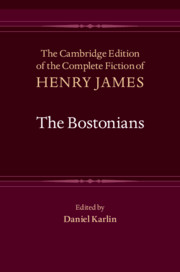Book contents
- Frontmatter
- Contents
- Acknowledgements
- List of Abbreviations
- General Editors’ Preface
- General Chronology of James’s Life and Writings
- Introduction
- Textual Introduction
- Chronology of Composition and Production
- Bibliography
- The Bostonians
- Glossary of Foreign Words and Phrases
- Notes
- Textual Variants
- Emendations
- Appendices
VI
Published online by Cambridge University Press: 11 April 2021
- Frontmatter
- Contents
- Acknowledgements
- List of Abbreviations
- General Editors’ Preface
- General Chronology of James’s Life and Writings
- Introduction
- Textual Introduction
- Chronology of Composition and Production
- Bibliography
- The Bostonians
- Glossary of Foreign Words and Phrases
- Notes
- Textual Variants
- Emendations
- Appendices
Summary
“OH, thank you,” said Miss Birdseye, “I shouldn't like to lose it; it was given me by Mirandola!” He had been one of her refugees in the old time, when two or three of her friends, acquainted with the limits of his resources, wondered how he had come into possession of the trinket. She had been diverted again, after her greeting with Doctor and Mrs. Tarrant, by stopping to introduce the tall, dark young man whom Miss Chancellor had brought with her to Doctor Prance. She had become conscious of his somewhat sombre figure, uplifted against the wall, near the door; he was leaning there in solitude, unacquainted with opportunities which Miss Birdseye felt to be, collectively, of value, and which were really, of course, what strangers came to Boston for. It did not occur to her to ask herself why Miss Chancellor didn't talk to him, since she had brought him; Miss Birdseye was incapable of a speculation of this kind. Olive, in fact, had remained vividly conscious of her kinsman's isolation until the moment when Mrs. Farrinder lifted her, with a word, to a higher plane. She watched him across the room; she saw that he might be bored. But she proposed to herself not to mind that; she had asked him, after all, not to come. Then he was no worse off than others; he was only waiting, like the rest; and before they left she would introduce him to Mrs. Farrinder. She might tell that lady who he was first; it was not every one that would care to know a person who had borne such a part in the Southern disloyalty. It came over our young lady that when she sought the acquaintance of her distant kinsman she had indeed done a more complicated thing than she suspected. The sudden uneasiness that he flung over her in the carriage had not left her, though she felt it less now she was with others, and especially that she was close to Mrs. Farrinder, who was such a fountain of strength. At any rate, if he was bored, he could speak to some one; there were excellent people near him, even if they were ardent reformers.
- Type
- Chapter
- Information
- The Bostonians , pp. 36 - 44Publisher: Cambridge University PressPrint publication year: 2019

